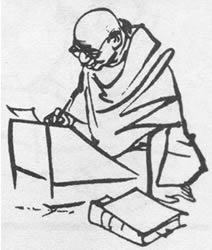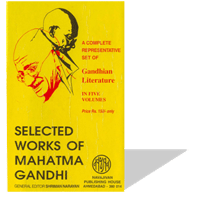
P.O. SEVAGRAM, DIST.WARDHA 442102, MS, INDIA. Phone: 91-7152-284753
FOUNDED BY MAHATMA GANDHI IN 1936
SECTION I : Selected Letters
[ from Selected Works of Mahatma Gandhi : Vol - 4 ]

SELECTED LETTERS
from
Selected Works of Mahatma Gandhi
Volume IV
Table of Contents
- Foreword
- Publisher's Note
SECTION I : LETTERS
- 1. To Dadabhai Naoroji
- 2. To G. K. Gokhale
- 3. To G. K. Gokhale
- 4. To Tolstoy
- 4A. From Count Leo Tolstoy
- 5. To Count Leo Tolstoy
- 6. To Leo Tolstoy
- 6A. From Count Leo Tolstoy
- 7. To Leo Tolstoy
- 7A. From Count Leo Tolstoy
- 8. To Maganlal Gandhi
- 9. To Maganlal Gandhi
- 10. To Narhar Shabhurao Bhave
- 11. To Mr Maffey, Private secretary To Viceroy
- 12. To W. B. Heycock
- 13. To Shankarlal on Ideas About Satyagraha
- 14. To Vinoba Bhave
- 15. To C F Andrews
- 16. To C F Andrews
- 17. To C F Andrews
- 18. To Kasturba Gandhi
- 19. To Kishorelal Mashruwala
- 20. To Sarojini Naidu
- 21. To Srinivas Sastri
- 22. To Srinivas Sastri
- 23. To Rabindranath Tagore
- 23A. From Rabindranath Tagore
- 24. To Rabindranath Tagore
- 25. From Rabindranath Tagore
- 25A. To Rabindranath Tagore
- 26. From Rabindranath Tagore
- 26A. To Rabindranath Tagore
- 27. To Rabindranath Tagore
- 28. To Rabindranath Tagore
- 29. To Rabindranath Tagore
- 30. To Rabindranath Tagore
- 31. To Rabindranath Tagore
- 32. From Rabindranath Tagore
- 32A. To Rabindranath Tagore
- 33. From G S Arundale
- 33A. To G S Arundale
- 34. To Every Englishman In India
- 35. To Viceroy
- 36. To Jawaharlal Nehru
- 37. To Jawaharlal Nehru
- 38. To Jawaharlal Nehru
- 39. To Jawaharlal Nehru
- 40. From Jawaharlal Nehru
- 41. To Jawaharlal Nehru
- 42. To Konda Venkatappayya
- 43. To T Prakasam
- 44. To Hakim Ajmal Khan
- 45. To Jamnalal Bajaj
- 46. To Mohomed Ali
- 47. To Motilal Nehru
- 48. To Motilal Nehru
- 49. To C Rajagopalachari
- 50. To C Rajagopalachari
- 51. To Kakasaheb Kalelkar
- 52. To A Friend
- 53. From Madeleine Slade or Miraben
- 53A. To Madeleine Slade
- 54. To Romain Rolland
- 55. To Romain Rolland
- 56. To Shri Shankaran
- 57. To Hermann Kallenbach
- 58. To Gulzarilal Nanda
- 59. To Dr Kailas Nath Kaju
- 60. To Dhan Gopal Mukherjee
- 61. To Henry S Salt
- 62. To The Viceroy
- 63. To Lord Irwin
- 64. To Reginald Reynolds
- 65. To Richard B Gregg
- 66. To Sir Samuel Hoare
- 67. To Ramsay MacDonald
- 68. To Pandit Malaviyaji
- 69. To The Secretary To The Government of Bombay, (Home Dept.), Poona
- 70. To Sir Tej Bahadur Sapru
- 71. To Carl Heath
- 72. To Carl Heath
- 73. To Carl Heath
- 74. To M A Jinnah
- 75. To M A Jinnah
- 76. To M A Jinnah
- 76A. From M A Jinnah
- 77. To M A Jinnah
- 78. From Subhash Chandra Bose
- 78A. To Subhash Chandra Bose
- 79. To Herr Hitler
- 80. To Every Briton
- 81. To Every Briton
- 82. To Generalissimo Chiang Kai-Shek
- 83. To Every Japanese
- 84. To American Friends
- 85. To Lord Linlithgow
- 86. To Lord Linlithgow
- 86A. From Lord Linlithgow
- 87. To Lord Linlithgow
- 87A. From Lord Linlithgow
- 88. To Lord Linlithgow
- 88A. From Lord Linlithgow
- 89. To Lord Linlithgow
- 90. To Agatha Harrison
- 91. To Winston Churchill
- 92. To Shriman Narayan
- 93. To Lord Pethick Lawrence
- 94. To Sardar Vallabhbhai Patel
- 95. To The Viceroy
- 96. To The Viceroy
- 96A. From Lord Mountbatten
- 97. To Abdul Ghaffar Khan
- 97A. From Abdul Ghaffar Khan
- 98. To A Friend
- 99. To Madame Edmond Privat
- 100. To The People of Gujarat
- Appendix I: Who Should Be Provincial Governors?
- Appendix II: A Psychological Explanation
- Appendix III: The Gandhian Constitutions for Free India
SECTION II : EXTRACTS FROM LETTERS
- Faith in God
- Religions and Scriptures
- Value of Prayer
- Truth and Non-violence
- The Science of Satyagraha
- Fasting in Satyagraha
- Unto This Last
- Khadi and Village Industry
- East and West
- Hindu-Muslim Unity
- Upliftment of Women
- The Good of All
- India's Freedom
- Education
- Caste System and Untouchability
- Brahmacharya
- Fearlessness
- Health and Hygene
- Self-restraint
- Self-development
- Selfless Service
- Voluntary Poverty
About This Volumes

Selected Works of Mahatma Gandhi comprises of Five volumes.
- Vol-I: Autobiography
- Vol-II: Satyagraha in South Africa
- Vol-III: Basic Works
- Ethical Religion
- Unto This Last
- Hind Swaraj or Indian Home Rule
- From Yeravada Mandir
- Discourses on the Gita
- Constructive Programme
- Key to Health
- Vol-IV: Selected Letters
- Vol-V: Voice of Truth
This book, Selected Letters, is volume-4.
Written by : M. K. Gandhi
General Editor : Shriman Narayan
Volume
Selected Works of Mahatma Gandhi : A set of five books
ISBN: 81-7229-278-3 (set)
Printed and Published by :
Jitendra T. Desai
Navajivan Mudranalaya,
Ahemadabad-380014
India
© Navajivan Trust, 1968
Download
Gandhi Letter 87 : To Lord Linlithgow
Detention Camp,
19-1-1943
DEAR LORD LINLITHGOW,
I received your kind letter of the 13th instant yesterday at 2.30
p.m. I had almost despaired of ever hearing from you. Please excuse
my impatience.
Your letter gladdens me to find that I have not lost caste with you.
My letter of 31st December was a growl against you. Yours is a counter-growl.
It means that you maintain that you were right in arresting me and
you were sorry for the omissions of which, in your opinion, I was
guilty.
The inference you draw from my letter is, I am afraid, not correct.
I have re-read my letter in the light of your interpretation, but
have failed to find your meaning in it. I wanted to fast and should
still want to if nothing comes out of our correspondence and I have
to be a helpless witness to what is going on in the country including
the privations of the millions owing to the universal scarcity stalking
the land.
If I do not accept your interpretation of my letter, you want me to
make a positive suggestion. This, I might, be able to do, only if
you put me among the members of the Working Committee of the Congress.
If I could be convinced of my error or worse, of which you are evidently,
I should need to consult nobody, so far as my own action is concerned,
to make a full and open confession and make ample amends. But I have
not any conviction of error. I wonder if you saw my letter to the
Secretary to the Government of India (H.D.) of September 23, 1942.
I adhere to what I have said in it and in my letter to you of August
14, 1942.
Of course I deplore the happenings that have taken place since 9th
August last. But have I not laid the whole blame for them at the door
of the Government of India? Moreover, I could not express any opinion
on events which I cannot influence or control and of which I have
but a one-sided account. You are bound prima facie to accept the accuracy
of reports that may be placed before you by your departmental heads.
But you will not expect me to do so. Such reports have, before now,
often proved fallible. It was that reason that in my letter of 31st
December I pleaded with you to convince me of the correctness of the
information on which your conviction was based. You will perhaps appreciate
my fundamental difficulty in making the statement you have expected
me to make.
This however, I can say from the house-top, that I am as confirmed
a believer in non-violence as I have ever been. You may not know that
any violence on the part of Congress workers, I have condemned openly
and unequivocally. I have even done public penance more than once.
I must not weary you with examples. The point I wish to make is that
on every such occasion I was a free man.
This time, the retracing, as I have submitted, lies with the Government.
You will forgive me for expressing an opinion challenging yours. I
am certain that nothing but good would have resulted if you had stayed
your hand and granted me the interview which I had announced, on the
night of August 8, I was to seek. But that was not to be.
Here, may I remind you that the Government of India have before now
owned their mistakes, as for instance, in the Punjab when the late
General Dyer was condemned, in the United Provinces when a corner
of a mosque in Cawnpore was restored and in Bengal when the Partition
was annulled. All these things were done in spite of great and previous
mob violence.
To sum up:
- If you want me to act singly, convince me that I was wrong and I will make ample amends.
- If you want me to make any proposal on behalf of the Congress you should put me among the Congress Working Committee members.
I do plead with you to make up your mind to end the impasse.
If I am obscure or have not answered your letter fully, please point out the omissions and I shall make an attempt to give you satisfaction.
I have no mental reservation.
I find that my letters to you are sent through the Government of Bombay. This procedure must involve some loss of time. As time is of the essence in this matter, perhaps you will issue instructions that my letters to you may be sent directly by the Superintendent of this camp.
I am,
Your sincere friend,
M. K. GANDHI
Gandhiji's Correspondence with the Government—1942-'44, pp. 21-22